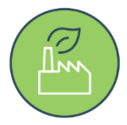Insight
Germany’s industry sector is highly diversified and a global leader in engineering, automotive, and chemicals production. In 2021, industrial activities accounted for approximately 23% of national greenhouse gas emissions, making decarbonisation in this sector a critical priority. Germany aims to achieve carbon neutrality by 2045, supported by strategies such as the National Hydrogen Strategy and funding initiatives like Carbon Contracts for Difference. These efforts focus on transitioning energy-intensive industries like steel, chemicals, and cement to sustainable practices.
Industry GHG Emissions
In 2021, Germany reported total greenhouse gas emissions of 764 million tonnes of CO2-equivalent, with 183 million tonnes attributed to industrial activities. Emissions from industrial processes reached approximately 57 million tonnes, led by cement and lime production at 18.2 million tonnes, followed by iron and steel at 16.4 million tonnes, and chemicals and refining at 6 million tonnes. Emissions from energy-related fuel combustion in manufacturing industries and construction were approximately 126 million tonnes, with iron and steel contributing around 30% of these emissions, making it the largest sector in this category.
Economic Relevance of Sectors
Chemicals & Refining
Annual turnover (2022):
261.2 billion €
Number of employees (2022):
353,512
Main export markets:
EU, USA, China
Biggest companies based on turnover:
BASF SE, DOW, Wacker, Bayer, Shell, BP
Metals Including Iron and Steel
Annual turnover:
Primary steel industry (2022): 55.2 billion €
Non-ferrous metals (2020): 53.2 billion €
Steel and metal processing industry: 80 billion €
Production capacity:
Raw steel (2022): 37 million tonnes
Non-ferrous metals (2020): 7.3 million tonnes
Number of employees:
Primary steel industry (2022): 90,000
Non-ferrous metals (2020): 108,295
Biggest companies based on turnover:
ArcelorMittal, ThyssenKrupp
Cement & Lime
Annual turnover:
Lime (2021): 0.7 billion €
Cement (2022): 3.5 billion €
Production capacity:
Lime (2021): 6 million tonnes
Cement (2022): 30 million tonnes
Number of employees:
Lime (2021): 3,100
Cement (2022): 12,100
Biggest companies based on turnover:
Lhoist, Fels Werke, HeidelbergCement, Cemex
Decarbonising the German Industry – Funding Opportunities
Germany supports the transition to climate-neutral practices in energy-intensive industries through several funding initiatives. The Carbon Contracts for Difference (CCfD) program, launched by the German Ministry for Economic Affairs and Climate Action (BMWK), provides financial incentives for adopting innovative, eco-friendly technologies in sectors such as steel, chemicals, and cement. The program has a total funding volume of 50 billion €.
The Federal Funding for Industry and Climate Protection (BIK) program supports investments and research projects that achieve a minimum 40% reduction in CO2 emissions compared to previous levels. Eligible projects must involve a minimum investment of 1 million €, or 0.5 million € for SMEs.
Relevant Policies and Roadmaps
Germany’s path to climate neutrality by 2045 is outlined in various strategies and roadmaps. The BMWK has developed a comprehensive carbon management strategy and proposed amendments to the Carbon Dioxide Storage Act. The National Hydrogen Strategy (NHS) targets carbon-neutral hydrogen production and aims to double electrolyser capacity by 2030. Germany’s cement association (VDZ) has introduced a roadmap to decarbonise cement and concrete production, emphasising cross-industry collaboration to achieve net-zero emissions.
Flagship Projects
The Everest project, led by Lhoist, is Germany’s largest carbon capture and storage (CCUS) initiative, aiming to store approximately 1.5 million tonnes of CO2 annually, marking a significant step towards carbon neutrality in the lime industry. The Concrete Chemicals project at Cemex’s Rüdersdorf plant focuses on producing 15,000 tonnes of e-kerosene annually using hydrogen generated from renewable energy. This project integrates advanced catalytic processes to achieve sustainable cement production. Both initiatives showcase Germany’s commitment to pioneering low-carbon technologies in energy-intensive industries.
The Cluster Decarbonisation in Industries (CDI) acts as a key network for driving climate-friendly industrial solutions in Germany. Based in Cottbus, CDI brings together stakeholders from science, business, politics, and administration to support innovative strategies for achieving greenhouse gas neutrality by 2045.

